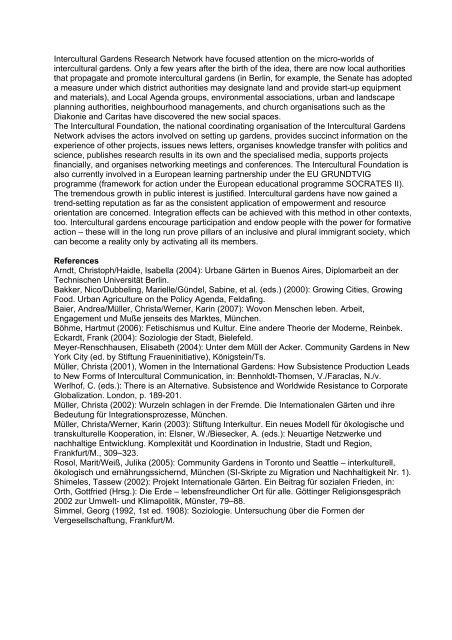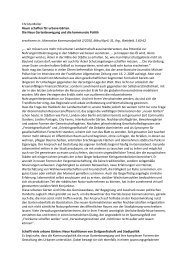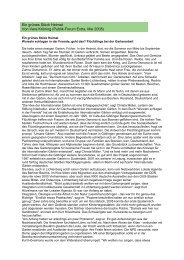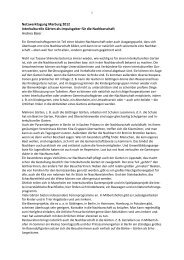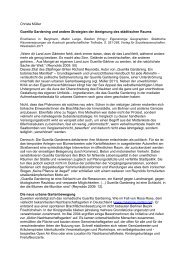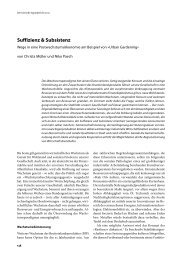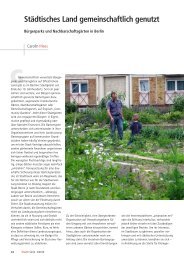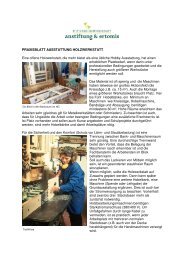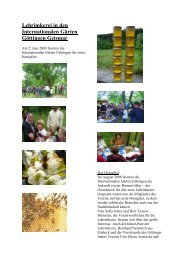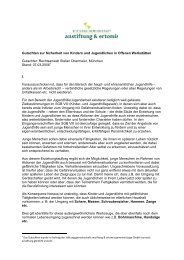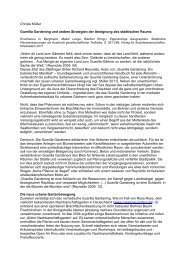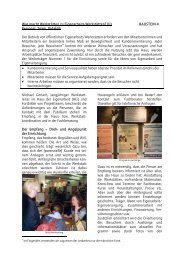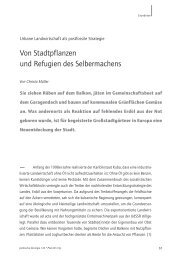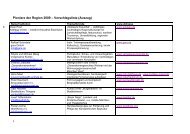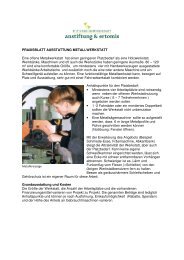Christa Müller - Stiftung Interkultur
Christa Müller - Stiftung Interkultur
Christa Müller - Stiftung Interkultur
You also want an ePaper? Increase the reach of your titles
YUMPU automatically turns print PDFs into web optimized ePapers that Google loves.
Intercultural Gardens Research Network have focused attention on the micro-worlds of<br />
intercultural gardens. Only a few years after the birth of the idea, there are now local authorities<br />
that propagate and promote intercultural gardens (in Berlin, for example, the Senate has adopted<br />
a measure under which district authorities may designate land and provide start-up equipment<br />
and materials), and Local Agenda groups, environmental associations, urban and landscape<br />
planning authorities, neighbourhood managements, and church organisations such as the<br />
Diakonie and Caritas have discovered the new social spaces.<br />
The Intercultural Foundation, the national coordinating organisation of the Intercultural Gardens<br />
Network advises the actors involved on setting up gardens, provides succinct information on the<br />
experience of other projects, issues news letters, organises knowledge transfer with politics and<br />
science, publishes research results in its own and the specialised media, supports projects<br />
financially, and organises networking meetings and conferences. The Intercultural Foundation is<br />
also currently involved in a European learning partnership under the EU GRUNDTVIG<br />
programme (framework for action under the European educational programme SOCRATES II).<br />
The tremendous growth in public interest is justified. Intercultural gardens have now gained a<br />
trend-setting reputation as far as the consistent application of empowerment and resource<br />
orientation are concerned. Integration effects can be achieved with this method in other contexts,<br />
too. Intercultural gardens encourage participation and endow people with the power for formative<br />
action – these will in the long run prove pillars of an inclusive and plural immigrant society, which<br />
can become a reality only by activating all its members.<br />
References<br />
Arndt, Christoph/Haidle, Isabella (2004): Urbane Gärten in Buenos Aires, Diplomarbeit an der<br />
Technischen Universität Berlin.<br />
Bakker, Nico/Dubbeling, Marielle/Gündel, Sabine, et al. (eds.) (2000): Growing Cities, Growing<br />
Food. Urban Agriculture on the Policy Agenda, Feldafing.<br />
Baier, Andrea/<strong>Müller</strong>, <strong>Christa</strong>/Werner, Karin (2007): Wovon Menschen leben. Arbeit,<br />
Engagement und Muße jenseits des Marktes, München.<br />
Böhme, Hartmut (2006): Fetischismus und Kultur. Eine andere Theorie der Moderne, Reinbek.<br />
Eckardt, Frank (2004): Soziologie der Stadt, Bielefeld.<br />
Meyer-Renschhausen, Elisabeth (2004): Unter dem Müll der Acker. Community Gardens in New<br />
York City (ed. by <strong>Stiftung</strong> Fraueninitiative), Königstein/Ts.<br />
<strong>Müller</strong>, <strong>Christa</strong> (2001), Women in the International Gardens: How Subsistence Production Leads<br />
to New Forms of Intercultural Communication, in: Bennholdt-Thomsen, V./Faraclas, N./v.<br />
Werlhof, C. (eds.): There is an Alternative. Subsistence and Worldwide Resistance to Corporate<br />
Globalization. London, p. 189-201.<br />
<strong>Müller</strong>, <strong>Christa</strong> (2002): Wurzeln schlagen in der Fremde. Die Internationalen Gärten und ihre<br />
Bedeutung für Integrationsprozesse, München.<br />
<strong>Müller</strong>, <strong>Christa</strong>/Werner, Karin (2003): <strong>Stiftung</strong> <strong>Interkultur</strong>. Ein neues Modell für ökologische und<br />
transkulturelle Kooperation, in: Elsner, W./Biesecker, A. (eds.): Neuartige Netzwerke und<br />
nachhaltige Entwicklung. Komplexität und Koordination in Industrie, Stadt und Region,<br />
Frankfurt/M., 309–323.<br />
Rosol, Marit/Weiß, Julika (2005): Community Gardens in Toronto und Seattle – interkulturell,<br />
ökologisch und ernährungssichernd, München (SI-Skripte zu Migration und Nachhaltigkeit Nr. 1).<br />
Shimeles, Tassew (2002): Projekt Internationale Gärten. Ein Beitrag für sozialen Frieden, in:<br />
Orth, Gottfried (Hrsg.): Die Erde – lebensfreundlicher Ort für alle. Göttinger Religionsgespräch<br />
2002 zur Umwelt- und Klimapolitik, Münster, 79–88.<br />
Simmel, Georg (1992, 1st ed. 1908): Soziologie. Untersuchung über die Formen der<br />
Vergesellschaftung, Frankfurt/M.


